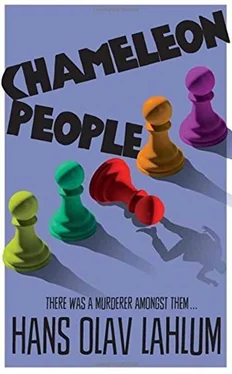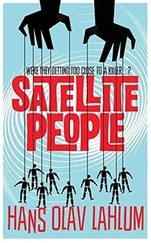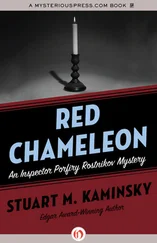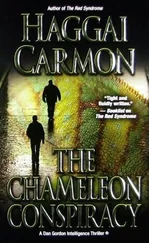Tor Johansen, an only child with a speech impediment and limp, had been born in February 1957. It was rather a striking coincidence that Mrs Johansen, who had been childless for so many years, only became pregnant while she was working here.
I looked directly at Odd Jørgensen and asked if he thought that there might have been some kind of relationship between Fredriksen and Mrs Johansen.
Jørgensen and Svendsen exchanged glances. Then Jørgensen replied: ‘I can neither confirm nor deny it, but now that you mention it, I did actually wonder myself at the time. There was one evening in the autumn of 1955 when I had been working late in the office, and was surprised when I left to discover that Fredriksen was still here. He had stopped to chat to Mrs Johansen while she worked. She was young and full of the joys of life back then, and was no doubt an attractive woman. I noticed him smile in a way I had never seen him smile before. But none of us really know the truth of the matter.’
I thanked him for this information. It was not confirmation, but definitely gave grounds for another conversation with Mrs Johansen. There were more and more strange little coincidences springing up in this case.
And now I could not postpone the inevitable. I put Jørgensen’s confession down on the desk and asked him to explain.
It was not a pleasant sight. The kind and apparently confident office manager broke down without even looking at the piece of paper. He collapsed forwards onto the desk and sat there with his face buried in his hands. He stayed like this for a minute or so, until the accountant gently put his arm across his rounded shoulders. This helped. The office manager slowly straightened up in his chair again.
I waited with a thumping heart to hear if he would now confess to murder. But he did not. When Odd Jørgensen did eventually speak, he only talked about the document.
‘What can I say, other than that I have hoped and prayed in recent days that that piece of paper, which I have lived in fear of for seven years now, had somehow miraculously disappeared. That piece of paper is a reminder of the only mistake I have made in my forty-five years as a law-abiding citizen, and it will now affect the rest of my life.’
I said, carefully, that it would be up to the heirs and possibly the public prosecutor to decide whether it was something they wanted to pursue or not, and that given the type of crime, the limitation period had probably elapsed.
Jørgensen shook his head and pointed out of the window.
‘Perhaps the public prosecutor will not bother with it, but the wolves out there will. And neither Ramdal, nor anyone else, will want an office manager who has embezzled funds. The sector has its channels and blacklists. If this got out, I would be lucky to find a job as a clerk. That is what Fredriksen said, that day in 1965. “If this ever leaves these four walls, Jørgensen, you are done for.” That is what he said. And he was right, of course.’
Once again, the office manager planted his elbows on the desk and buried his face in his hands. And once again the accountant laid his arm protectively round his shoulders. I had understood the secret of the relationship between them now. And they had both understood that I had understood. Certainly, none of us wished to go into any further detail. Instead, we continued to talk about the confession.
I told Jørgensen that it might not be necessary for it to become publicly known, but the best thing he could do now would be to tell me the truth.
‘The truth is, in short, that I am a weak person who made a fatal error of judgement and, for very personal reasons, embezzled a large amount of money from the company. It was meant as a loan just for a few weeks while I waited for a bank loan to be sorted out, but I was found out. Fredriksen didn’t go to the police. He let me keep my job, but demanded that I pay back the money the same day – and that I sign a confession, in the event that he might have a need for it later.’
I asked why he had done it. The office manager replied that it was highly personal. For once, he was contradicted by the accountant.
‘You are too hard on yourself and too kind to others, Odd,’ he said, in a quiet voice.
Then he turned to me and spoke normally. ‘It was not for Odd, but for my mother. She had been diagnosed with a cancer that could not be treated in Norway. Our only hope was a doctor in a private hospital in the USA, who had saved several patients with the same type of cancer, despite patients being diagnosed as terminal. My mother had no income. I am an only child and as a recent graduate did not have the means to help her. It was a matter of days, and no bank was willing to give us such a big loan in time. Odd desperately wanted to help me save my mother. He asked his employer for a loan – and borrowed the money anyway when Fredriksen, who was a multi-millionaire, said no.’
‘Erling never asked me to do it, and did not know about it either. It was my decision and my mistake,’ Odd Jørgensen said, with his face hidden in his hands.
‘But it was my mother – and for my sake. And you did nothing wrong, Odd. You did what you thought best. It was Fredriksen who not only proved how heartless he was, but also cynically used the opportunity to exploit us.’
‘And what about your mother?’ I asked, gently.
This gave rise to more tears from the office manager, who was clearly the more emotional of the two. The accountant had kept his composure throughout, but his voice was hard, brusque and angry when he answered.
‘Fredriksen demanded to have the money back the same day, and he got it. My mother never got to the doctor in the US. She died in Oslo a few months later.’
‘So, the short version is: Fredriksen’s heartless exploitation of the situation meant that you, Erling, lost your mother and you, Odd, have lived with the constant threat of scandal and being fired. And you both had to carry on working here year after year for poor pay.’
They both nodded.
‘We hated him and hoped that when the day came he would go straight to hell!’ the office manager said with unexpected intensity.
The accountant agreed in his concise, controlled manner.
I said that on a human level, I could understand that, but that I was duty-bound to ask them both where they were when Fredriksen was killed last Saturday evening.
They looked at each other – then there was a fleeting smile before they were both serious again.
‘We were where we always are on Saturday evenings. Together at Erling’s, behind closed doors,’ Odd Jørgensen said quietly and discreetly.
I found the situation rather embarrassing and awkward. But I looked at Erling Svendsen and asked where he lived.
‘I have a small one-bedroom flat in Eilert Sund’s Street,’ he replied, and then was suddenly quiet.
A heavy silence sank over the room. I sat and wondered whether it was just a coincidence that Eilert Sund’s Street was in Majorstuen, within walking distance of Jacob Aall’s Street and the corner of Kirk Road where Fredriksen had been stabbed.
Between the two piles of paper on Jørgensen’s desk lay a pipe and a box of matches. I had a sudden impulse to strike a match and burn Jørgensen’s confession. But I already had more than enough problems in terms of the investigation and did not need to add burning material evidence to the list. Furthermore, I was no longer sure that one of the two men sitting here, alarmingly close, had not taken the matter into their own hands and killed their much-hated boss. They had already admitted that they despised him. And the visit from the boy on the red bicycle’s mother a few days earlier must have been an uncomfortable reminder of just how heartless Per Johan Fredriksen could be when it came to business and other people.
Читать дальше












